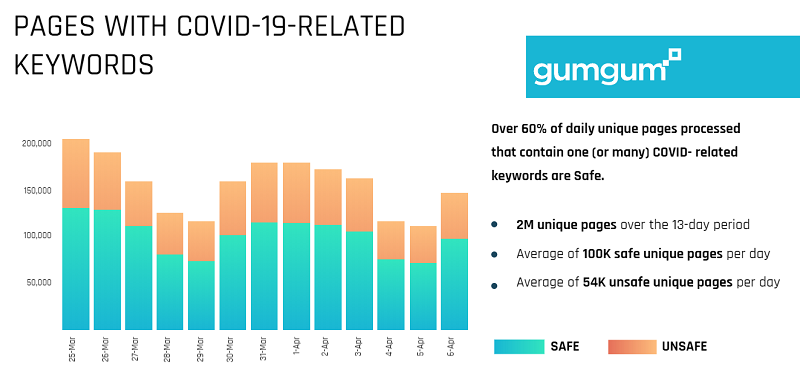Keyword-based safety strategies are unduly denying brands access to vast viable ad inventories during the Covid-19 pandemic, according to new research.
The study, from AI ad tech firm GumGum used findings from analysis by Verity, the company’s machine learning-based content analysis and brand safety engine.
Between March 25th and April 6th, Verity identified 2.85 million unique pages containing COVID-related keywords across GumGum’s publisher network. Of those pages, the system’s threat detection models classified 62% as ‘Safe’.
“All the concerns raised lately about coronavirus keyword blocking hurting publishers are valid,” said GumGum CEO Phil Schraeder. “But this data shows that keyword-based brand safety is also failing brands. It’s effectively freezing advertisers out of a huge volume of safe trending content, limiting their reach at a time when it should actually be expanding as more people than ever are consuming online content.”
In that one week alone, brands relying on keyword-based systems for brand safety protection missed out on over 1.5 billion impressions across GumGum’s supply, Mr. Schraeder pointed out, adding that GumGum’s publisher network offers a representative sample of impressions available across the wider web. Brands would have been blocked from accessing those impressions because the pages on which the impressions appeared contained one or more instance of the words “covid”, “covid19”, “covid-19”, “covid 19”, “coronavirus”, “corona virus”, “pandemic”, or “quarantine”.
Verity deemed them brand safe based on multi-model natural language processing and computer vision analysis, which integrates assessments from 8 machine learning models trained to evaluate threat-levels across distinct threat categories. The system’s threat sensitivity is adjustable as is its confidence threshold for validating safety conclusions. The findings released today are based on Verity’s nominal safety and confidence settings––configured to align with the threat sensitivity of an average Fortune 100 brand.
“Even when we apply the most conservative settings, more than half the content is safe,” said GumGum CTO, Ken Weiner. “Coronavirus is touching every facet of society, so it’s hardly surprising that even the most innocuous content references it. Keyword blocking just goes way too far, which is why people are calling for whitelisting of specific websites. That mindset shows what’s wrong with the way people think about brand safety these days. The idea that you have to choose between reach and safety is false. Our industry needs to wake up to what’s technologically available.”
Mr. Weiner noted that GumGum’s analysis shows that the pages containing COVID-related keywords in certain popular IAB content categories are particularly safe.
“Let me put it this way: If you’re looking for a quick and easy brand safety solution right now – rather than keyword blocking or whitelisting everything – I’d recommend simply advertising on content categories like technology, pop culture, and video gaming. You’ll get plenty of reach and over 80% of their covid-related content is safe.”
To see and download the complete findings from GumGum’ COVID-related content analysis, click here.
Source: www.gumgum.com

